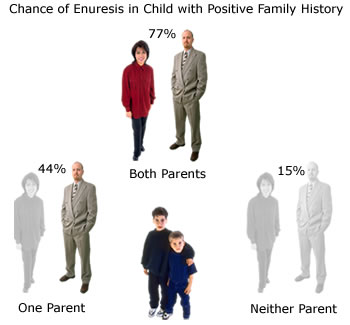Your Cart is Empty
Free Shipping on ALL alarms!
And on all orders of $35 or more *Continental US only
Free Shipping on ALL alarms!
And on all orders of $35 or more *Continental US only
Jill writes that 3 of her 4 children currently have or have had problems with bedwetting. Her husband recalls bedwetting until middle school. She does not remember bedwetting herself, but her sister had bedwetting until about 10 years of age. Her mother says the reason her children have bedwetting is that she left them in disposable pants too long. Why do none of her friends' children have this problem, and most of hers do?

Bedwetting is inherited and in fact, heredity as a causative factor of primary nocturnal enuresis has been confirmed by the identification of a gene marker. Studies suggest the existence of a dominant gene located on chromosome 13 and another gene on chromosome 12. In most studies, the father was more often affected than the mother, which is consistent with the fact that nocturnal enuresis is more common in boys than girls. The National Center for Biotechnology Information (NCBI) has an interesting site that identifies several genetic studies and provides an actual gene map showing the locus of the gene on chromosome 13.
So you can see, Jill, your parenting is not the reason that 75% of your children are affected by bedwetting. You can thank the combination of you and your husband's genes! The best news is that even with a strong family history of bedwetting, your children can achieve dryness. Bedwetting alarms give children the tools to help speed up the natural process of becoming dry. Instead of taking years to get dry at night, modern technology allows the kids to do this in a few weeks or months.
Comments will be approved before showing up.